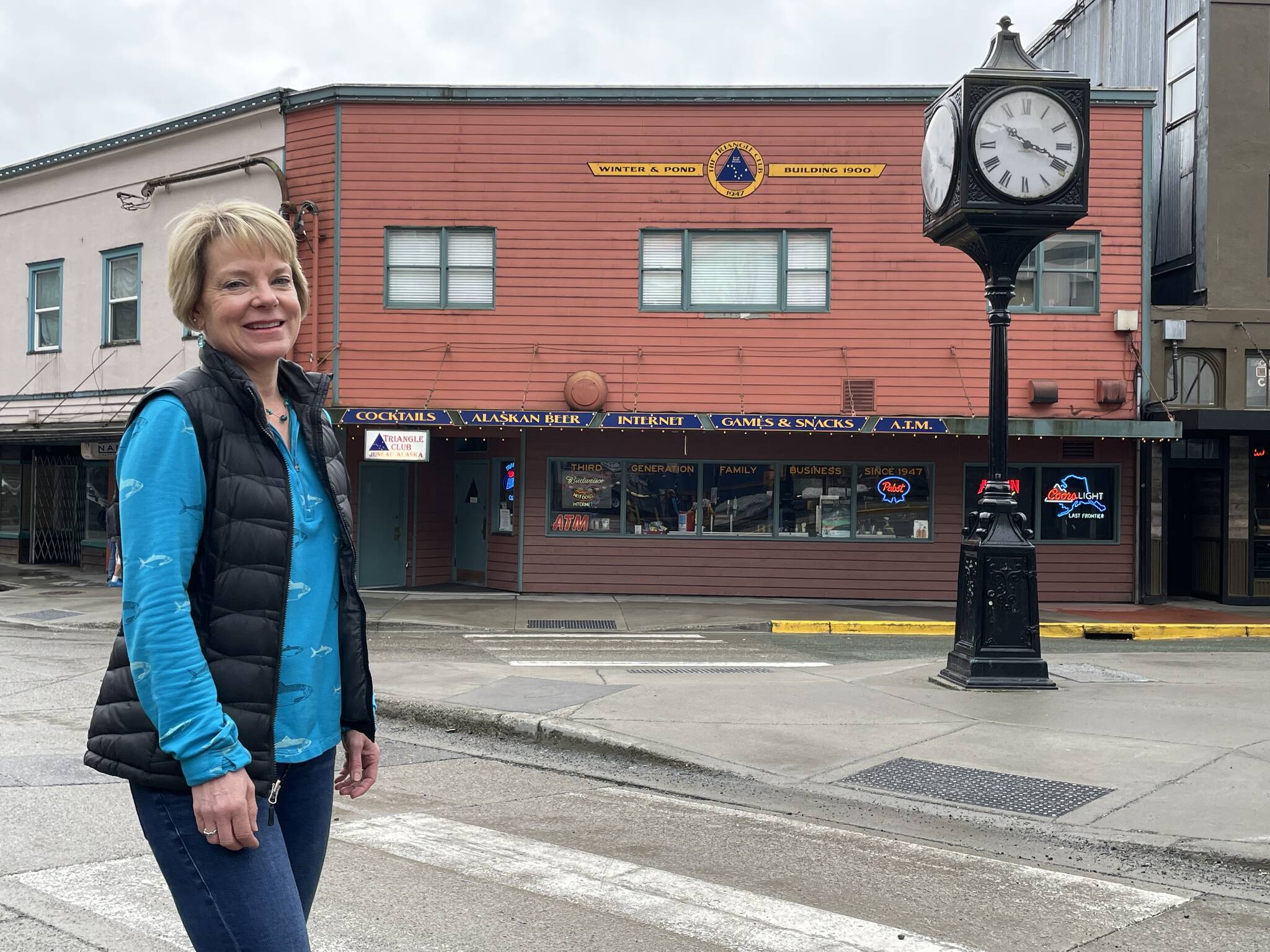It is fitting that one of Juneau’s best displays of historical photographs hang in the building that once housed the famous Winter and Pond photography studio in the late 1890s.
The Triangle Club, at the intersection of Front and Franklin streets, offers viewers interior walls covered with historic photos of shipwrecks, lighthouses, wood-planked streets, and scenes of old Juneau. A unique underground mining scene painted on velvet in 1967 continues to enchant customers.
Today’s Triangle Club celebrates 76 years of operation by the Thomas family. Joe Thomas Sr., his son Joe Jr., and now Leeann Thomas, Joe Sr.’s granddaughter and Joe Jr.’s daughter, welcome customers who watch Front Street activity through large windows while sipping hot or cold beverages at the long bar that snakes around the room. The club passed from generations in 1965 and 2000.
The building has a fascinating chronology that is well documented. Although the original 1900 Winter and Pond photo studio relocated, the triangular building’s unique footprint remains as it was more than a century ago.
Using resources at the Alaska Historical Library on Whittier Street, a researcher can easily consult downtown photographs and newspapers to verify information. The collection also contains detailed Sanborn Insurance Company maps prepared for fire protection. The archival maps of 1904, 1914 and 1927 show the evolution of buildings along Juneau’s irregular waterfront that is now Front and South Franklin streets. The map plates include residential neighborhoods as well as Douglas and Treadwell.
By 1906, Winter and Pond moved their photography studio to Main Street at the end of Front Street. Their vacated building then became the Alaska Grill, which advertised chops and oysters on their outdoor sign, along with a separate “Ladies Entrance.”
Prohibition changed Juneau as it did other American communities. Legal liquor sales were banned in Juneau with bars closing on Jan. 1, 1918 and not reopening until 1933. Juneau voters supported the closure by a 2-1 vote. Saloons became restaurants, billiard parlors or other businesses.
During the 1920s, the triangle corner building housed the Junction Store serving miners and others as a general hardware store. A historical photo of this enterprise includes another foundational Juneau business: two dappled horses pulling a wagon that are the first drayage team belonging to Reliable Transfer.
After Prohibition was repealed nationally, in 1934 Wilbur Burford and Emmett Botelho opened Burford’s Corner Bar. The name was changed to the Triangle Inn the following year. By 1947, Joe Thomas Sr. bought the business and began the family legacy. Into the 1960s, he served drinks chilled by Mendenhall Glacier ice collected from the lake by Hank Mead.
As with other historic downtown buildings, structural upgrades are an essential step for longevity. In the 1980s when the city modernized utilities by moving them underground and replacing early waterfront pilings with dirt foundations, Joe Jr. did a major remodeling of the building. He sold the bar to his daughter in 2000.
Since that time, the third Thomas owner continues improving the property. Leeann has installed a heat pump, replaced the roof, put in new lighting and added historic signage. Her desire is to retain the “feel of an old-time Alaskan socializing spot, but with a clean, modernized bar.”
“When I think back on all the stories my great-grandmother told of living here in the early 1900s, I’m thankful we still have the Triangle Club Building and others like it to visualize what life looked like back then,” said Leeann Thomas on a sunny day when a shiny new beer cooler was delivered. “I hope this stays a gathering place for locals and visitors to come together and learn we have more in common than not. For another 76 years.”
• Laurie Craig is an artist, advocate and avid researcher of Juneau’s historical treasures. Rooted in Community is a series of short articles, published in the Empire on the third weekend of each month, focusing on unique buildings in Juneau’s Downtown Historic District and the present-day businesses (and people) that occupy them. This work is supported by the Downtown Business Association. This article has been moved in front of the Empire’s paywall.

